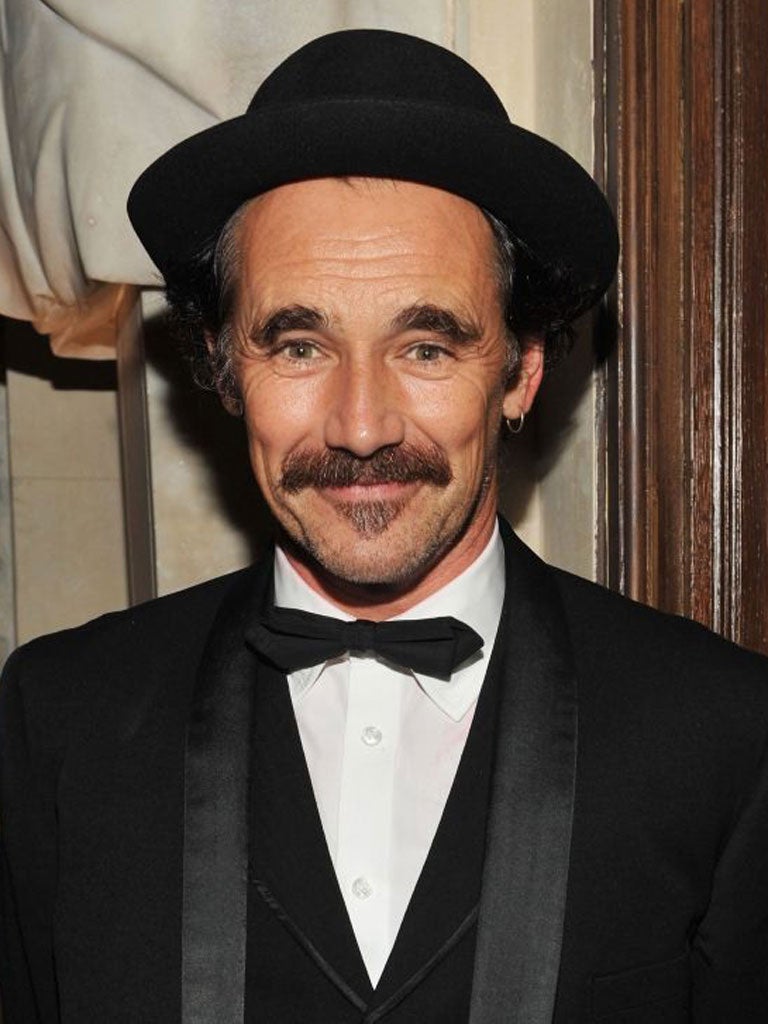Your support helps us to tell the story
From reproductive rights to climate change to Big Tech, The Independent is on the ground when the story is developing. Whether it's investigating the financials of Elon Musk's pro-Trump PAC or producing our latest documentary, 'The A Word', which shines a light on the American women fighting for reproductive rights, we know how important it is to parse out the facts from the messaging.
At such a critical moment in US history, we need reporters on the ground. Your donation allows us to keep sending journalists to speak to both sides of the story.
The Independent is trusted by Americans across the entire political spectrum. And unlike many other quality news outlets, we choose not to lock Americans out of our reporting and analysis with paywalls. We believe quality journalism should be available to everyone, paid for by those who can afford it.
Your support makes all the difference.Mark Rylance, one of Britain's most respected actors and the founding artistic director of Shakespeare's Globe theatre in London, has defended his role in a film that pours doubt on the identity of the Bard.
The actor, who has signed a "declaration of reasonable doubt" about Shakespeare's identity, also responded to claims that those who doubt the playwright are motivated by envy.
Anonymous, directed by Roland Emmerich, partly espouses the "Oxfordian theory" – that it was Edward de Vere, Earl of Oxford, and not Shakespeare, who wrote some of literature's greatest plays.
The film has reignited the debate between conspiracy theorists and those who defend Shakespeare's legacy. The Shakespeare Birthplace Trust has set up an online campaign which attempts to combat the doubters, securing contributions from the Prince of Wales, the actor Simon Callow and Gregory Doran, the chief associate director of the Royal Shakespeare Company.
One defender, the psychoanalyst Anouchka Grose, says "doubting Shakespeare's authorship might be a way of dealing with envy and competition," adding: "If great people aren't actually that great then you don't have to feel quite so measly in relation to them."
"I was staggered," Rylance told The Independent. "To make an analysis of why someone like me doubts that Shakespeare wrote the plays? Without meeting me, or asking me, or meeting anyone who doubts? Not even positing that it might be that we are curious about the truth? That we think this isn't maybe true? They really are defensive. It's a classic response that they attack us, our motivations."
Rylance, who is starring in Jerusalem at the Apollo theatre in London, said he and fellow actor, Sir Derek Jacobi, were part of a forthcoming "response" to the trust's audio website, "60 Minutes with Shakespeare," possibly in the form of a published letter. Both Rylance and Sir Derek appear in Emmerich's film, and have signed the Declaration of Reasonable Doubt, run by The Shakespeare Authorship Coalition. Other high-profile signatories include the actors Jeremy Irons and Michael York.
Rylance will discuss his views at the Coalition's annual conference at the Globe next month, where there will be a screening of the documentary, Last Will and Testament. The film's backers claim it is "the first major documentary on the authorship question for 22 years".
Rylance added he hasn't yet seen Anonymous and tried to distance himself from some aspects of the film. He said: "I read the script and talked with Roland and eventually, after a lot of thought, I didn't want to be identified with the Oxfordian theory ... he's the darkest candidate."

Watch Apple TV+ free for 7 days
New subscribers only. £8.99/mo. after free trial. Plan auto-renews until cancelled

Watch Apple TV+ free for 7 days
New subscribers only. £8.99/mo. after free trial. Plan auto-renews until cancelled
The actor also expressed concern over the way Shakespeare is taught in schools. "I'm interested in his intentions and his intentions are for the stuff to be play-acted," he said. "I don't think he was particularly concerned initially about it being read. To me, the work is about the relationship of the emotions and the mind. If you just read them you are really only getting the mindful part of it."

Join our commenting forum
Join thought-provoking conversations, follow other Independent readers and see their replies
Comments